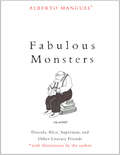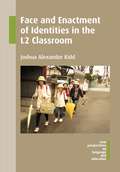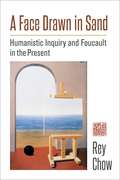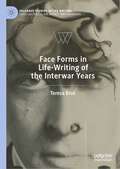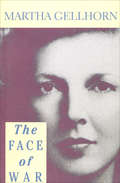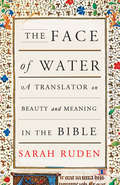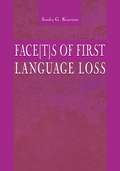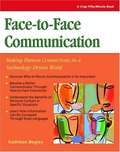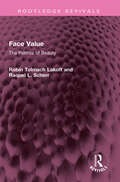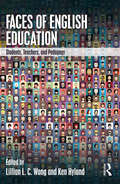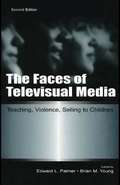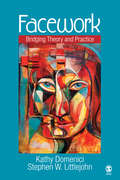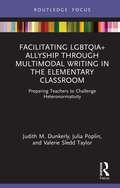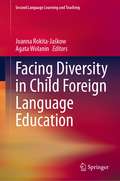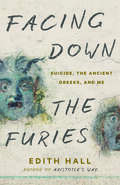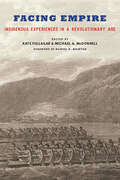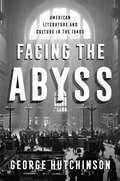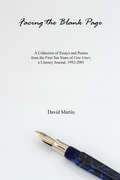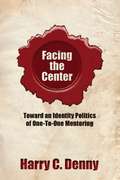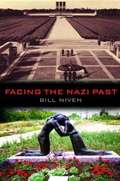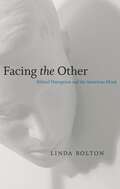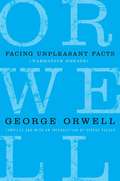- Table View
- List View
Fabulous Monsters: Dracula, Alice, Superman, and Other Literary Friends
by Alberto ManguelAn original look at how literary characters can transcend their books to guide our lives, by one of the world's most eminent bibliophiles Alberto Manguel, in a style both charming and erudite, examines how literary characters live with us from childhood on. Throughout the years, they change their identities and emerge from behind their stories to teach us about the complexities of love, loss, and the world itself. Manguel’s favorite characters include Jim from Huckleberry Finn, Phoebe from The Catcher in the Rye, Job and Jonah from the Bible, Little Red Riding Hood and Captain Nemo, Hamlet’s mother, and Dr. Frankenstein’s maligned Monster. Sharing his unique powers as a reader, Manguel encourages us to establish our own literary relationships. An intimate preface and Manguel’s own “doodles” complete this delightful and magical book.
Face and Enactment of Identities in the L2 Classroom
by Joshua Alexander KiddThis book examines student identities as revealed through the pragmatics of face as observed in the context of English L2 classroom interaction between Japanese students and a native speaker teacher. Classroom recordings together with retrospective interviews reveal specific points during learning activities when the students and their teacher s interpretations of classroom communication deviate from what was intended. This research study is a potent reminder that what students and teachers may consider as standard and conventionally acceptable language use and behaviour within the classroom context can differ dramatically according to social, cultural and individual frames of reference. The book outlines an innovative teacher professional development program which encourages teachers to reflect on and, where desired, modify or discontinue existing pedagogic practices. "
A Face Drawn in Sand: Humanistic Inquiry and Foucault in the Present
by Rey ChowLeadership, innovation, diversity, inclusiveness, sharing, accountability—such is the resounding administrative refrain we keep hearing in the contemporary Western university. What kinds of benefits does this refrain generate? For whom? What discursive incitements undergird such benefits? Although there are innumerable discussions of Michel Foucault in the English-speaking academy, seldom is his work used systematically to unravel the dead ends and potentialities of humanistic inquiry as embedded in these simple but dynamic questions.Rey Chow takes up this challenge by articulating the plight of the humanities in the age of global finance and neoliberal mores through a resharpened focus on Foucault’s concept “outside.” This general discussion is followed by a series of micro-arguments about several loosely linked topics: the biopolitics of literary study, visibilities and invisibilities, race and racism, sound/voice/listening, and confession and self-entrepreneurship. Against what she polemicizes as the moralistic-entrepreneurial norming of knowledge production, Chow foregrounds a nonutilitarian approach, stressing anew the intellectual and pedagogical objectives fundamental to humanistic inquiry: How to process, analyze, and evaluate different types of texts across languages and disciplines; how to form and sustain viable arguments; how to rethink familiar problems through less known as well as very well-known sources, figures, and methods. Above all, she asks in an abidingly humanistic spirit, how not to know all the answers before the questions have been posed.
Face Forms in Life-Writing of the Interwar Years (Palgrave Studies in Life Writing)
by Teresa BruśThis book is an interdisciplinary study of the engagement with and representation of the face across literature, photography, and theatre. It looks at how the face is an active agent, closely connected with the history of the media and the social interactions reflected in media images. Focusing on the dynamic period of the interwar years, it explores a range of case studies in Poland, UK, and the US, and examines artists like Stanisław Ignacy Witkiewicz (Witkacy), Virginia Woolf, Debora Vogel, Sir Cecil Beaton, Theodore Władysław Benda, and Edward Gordon Craig. Teresa Bruś argues that these writers and photographers defended the face against threats from modern life – not least, the media. She focuses on transformations of the face in life writing across a range of media and draws attention to the artists’ autobiographical narratives.
The Face of War: Writings From The Frontline, 1937-1985
by Martha GellhornMartha Gellhorn (1908–1998) was a war correspondent for nearly fifty years. From the Spanish Civil War in 1937 through the wars in Central America in the mid-eighties, her candid reports reflected her feelings for people no matter what their political ideologies, and the openness and vulnerability of her conscience. I wrote very fast, as I had to,” she says, afraid that I would forget the exact sound, smell, words, gestures, which were special to this moment and this place.” Whether in Java, Finland, the Middle East, or Vietnam, she used the same vigorous approach. Collected here together for the first time, The Face of War is what The New York Times called a brilliant anti-war book.”
The Face of Water: A Translator on Beauty and Meaning in the Bible
by Sarah RudenA dazzling reconsideration of the original languages and texts of the Bible, in both the Old and the New Testaments, from the acclaimed scholar and translator of Classical literature (“The best translation of the Aeneid, certainly the best of our time” —Ursula Le Guin; “The first translation since Dryden that can be read as a great English poem in itself” —Garry Wills, The New York Review of Books) and author of Paul Among the People (“Astonishing . . . Superb” —Booklist, starred review). In The Face of Water, Sarah Ruden brilliantly and elegantly explains and celebrates the Bible’s writings. Singling out the most famous passages, such as the Genesis creation story, the Ten Commandments, the Lord’s Prayer, and the Beatitudes, Ruden reexamines and retranslates from the Hebrew and Greek what has been obscured and misunderstood over time. Making clear that she is not a Biblical scholar, cleric, theologian, or philosopher, Ruden—a Quaker—speaks plainly in this illuminating and inspiring book. She writes that while the Bible has always mattered profoundly, it is a book that in modern translations often lacks vitality, and she sets out here to make it less a thing of paper and glue and ink and more a live and loving text. Ruden writes of the early evolution, literary beauty, and transcendent ideals of the Hebrew Bible and the Greek New Testament, exploring how the Jews came to establish the greatest, most enduring book on earth as their regional strategic weakness found a paradoxical moral and spiritual strength through their writings, and how the Christians inherited and adapted this remarkable literary tradition. She writes as well about the crucial purposes of translation, not only for availability of texts but also for accountability in public life and as a reflection of society’s current concerns. She shows that it is the original texts that most clearly reveal our cherished values (both religious and secular), unlike the standard English translations of the Bible that mask even the yearning for freedom from slavery. The word “redemption” translated from Hebrew and Greek, meaning mercy for the exploited and oppressed, is more abstract than its original meaning—to buy a person back from captivity or slavery or some other distress. The Face of Water is as much a book about poetry, music, drama, raw humor, and passion as it is about the idealism of the Bible. Ruden’s book gives us an unprecedented, nuanced understanding of what this extraordinary document was for its earliest readers and what it can still be for us today
Face[t]s of First Language Loss
by Sandra G. KouritzinThis book contributes to the understanding of first-language loss in both immigrant and indigenous communities in (at least) three ways. First, it provides insight into the process of language loss and the factors contributing to it. Second, it attempts to define, from an insider perspective, what it means to "lose" a language. Third, it analyzes the perceived consequences of first language loss in terms of social, academic, emotional, and economic factors--an approach previously lacking in research on language loss. Most studies of first language loss are impersonal, even when they tell emotional stories. This polyphonic book about language loss and imperfect learning of heritage languages tells the inside story. Easy to read and yet academic, it gives voice to five different storytellers who relate the histories of their first language loss and analyzes themes from 21 life-history case studies of adults who had lost their first languages while learning English. The stories in this book make a compelling argument that heritage languages should be preserved, that ESL should be about developing bilinguals not English monolinguals. Important reading for researchers, practitioners, and graduate students in ESL and bilingual education, multicultural education, cultural studies, and sociology, this book will also interest qualitative researchers as an example of a unique form of both doing and writing research.
Face To Face
by Ved MehtaThe autobiography of a man in India, blind since birth and growing up during the last years of British rule, the tragedy of Partition, the conflicts between Muslims and Hindus, his journey to a new life in the United states, much more, reflecting the anguish of being blind amidst all these changes and sufferings, offering hope and insights to the modern world.
Face-to-Face Communication: Making Human Connections in a Technology-Driven World
by Kathleen A. BegleyEven as technology has allowed us to connect with an ever-expanding global network through the click of a mouse, face-to-face communication is still as important as ever. Improving one's in-person communication may seem nonessential and downright quaint in this computerized age, yet many workplace situations, often those involving conflict, feelings, or other sensitive issues, still demand human contact. FACE-TO-FACE COMMUNICATION explores why personal contact remains the most powerful type of human interaction and what readers can do to improve their skills to become excellent communicators.
Face Value: The Politics of Beauty (Routledge Revivals)
by Robin Lakoff Raquel ScherrFirst published in 1984, Face Value confronts the pervasive power of beauty through art and literature, as well as interviews with men and women with varying perspectives on the subject. The topics covered range widely: the history of beauty from the Greeks to the present; the pathology of beauty: how women have been willing to harm themselves, mentally and physically, to achieve ‘beauty’; the language we use to speak of beauty, and its implications; our attitudes towards beauty, as examined by psychologists; beauty and ethnic identity; men and beauty. The authors present in fact a redefinition of beauty, enabling both women and men to enjoy it in themselves and in others, while discarding the sex-role stereotypes that have governed the definition of beauty in the past. With a new preface that explores the gaps created by time in the book’s discourse, this book will be of interest to students of linguistics, gender studies, women’s studies, cultural studies, sociology and anthropology.
Faces and Places in America
by Tomas Fernandez Tony Bonaventure Deborah J. ShortNIMAC-sourced textbook
Faces of English Education: Students, Teachers, and Pedagogy
by Lillian L. C. Wong Ken HylandFaces of English Education provides an accessible, wide-ranging introduction to current perspectives on English language education, covering new areas of interest and recent studies in the field. In seventeen specially commissioned chapters written by international experts and practitioners, this book: offers an authoritative discussion of theoretical issues and debates surrounding key topics such as identity, motivation, teacher education and classroom pedagogy; discusses teaching from the perspective of the student as well as the teacher, and features sections on both in- and out-of-class learning; showcases the latest teaching research and methods, including MOOCs, use of corpora, and blended learning, and addresses the interface between theory and practice; analyses the different ways and contexts in which English is taught, learned and used around the world. Faces of English Education is essential reading for pre- and in-service teachers, researchers in TESOL and applied linguistics, and teacher educators, as well as upper undergraduate and postgraduate students studying related topics.
The Faces of Televisual Media: Teaching, Violence, Selling To Children (Routledge Communication Series)
by EDWARD L.PALMER and BRIAN M.YOUNGThis collection offers original, state-of-the-art contributions from leading authorities in children's televisual media. International researchers from communication and psychology provide readers with ready access to current televisual research, trends, and policymaking/political climate issues pertaining to children. This second edition provides a current summary of studies on content, viewing patterns, comprehension, effects, and individual differences in instructional and educational programming, televisual entertainment and violence programming, and televisual advertising to children. Editors Edward L. Palmer and Brian M. Young have structured the volume into three sections examining the "faces" of television: the Teaching (instructional/educational) Face, the Violent Face, and the Selling (advertising) Face. Chapters within each section identify and focus recurrent themes while integrating them topically into a coherent whole. Each area incorporates new technologies and considers their potentials, effects, and future. Subjects featured in the various chapters include: *cross-cultural and historical comparisons with an in-depth perspective on the BBC and other European/Asian televisual media roots, as well as America's formative televisual media roots; *an examination of key differences between developed and developing countries; *implications of emerging instructional/educational media for children's education--addressing both cognitive and multi-ethnic aspects; and * prominent, informed challenge to the prevailing popular view that children are unaffected and unharmed by exposure to media violence. This volume informs ongoing debates across a broad spectrum of current, critical issues, and suggests avenues for future research. It is pertinent and provocative for the most sophisticated scholar in the field, as well as for students in areas of developmental or social psychology, communication, education, sociology, marketing, broadcasting and film, public policy, advertising, and medicine/pediatrics. It is also appropriate for courses in children, media, and society.
Facework: Bridging Theory and Practice
by Kathy L. Isaacson Dr Stephen W. LittlejohnWritten in a clear, engaging style Facework: Bridging Theory and Practice introduces a new paradigm that identifies facework as the key to communication within the management of difference. Authors Kathy Domenici and Stephen W. Littlejohn illustrate how facework is a central process in the social construction of both identity and community.
Facilitating LGBTQIA+ Allyship through Multimodal Writing in the Elementary Classroom: Preparing Teachers to Challenge Heteronormativity (Routledge Critical Studies in Gender and Sexuality in Education)
by Judith M. Dunkerly Julia Poplin Valerie Sledd TaylorThis book reports findings of a qualitative study intended to disrupt notions of heteronormativity amongst preservice elementary teachers by engaging them in multimodal writing and text production around issues facing LGBTQIA+ youth. Against the backdrop of increasing anti-transgender sentiment in the United States, the text highlights the necessity of integrating queered pedagogy in teacher education to facilitate candidates’ movement through the continuum and leave them prepared, equipped, and willing to support children identifying as LGBTQIA+. Through analysis of picture books, infographics, and multimodal texts produced by teacher candidates, this cutting-edge volume develops a continuum of engagement, from apathy through to active allyship, with LGBTQIA+ youth. This timely volume will benefit researchers, academics, and educators with an interest in gender and sexuality studies, primary and elementary education, as well as teacher education more specifically. Those involved with queer theory and the sociology of education will also benefit from this volume.
Facing Diversity in Child Foreign Language Education (Second Language Learning and Teaching)
by Joanna Rokita-Jaśkow Agata WolaninThis edited book uses the concept of diversity in child foreign language education as a major organizing principle. Since a foreign language, most typically English, is taught globally to an increasing number of children, the variability in the process and varied learning outcomes are inescapable phenomena. This book has been constructed on the premise that heterogeneity, first, concerns young language learners, who due to the disparity in the pace of development need appropriately tailored educational solutions, and, second, it refers to a diversity of contexts in which learning takes place. The contexts can be defined on a macroscale (e.g. different countries), mesoscale (e.g. different institutions), and microscale (e.g. specific learner groups). The book consists of four thematic strands. In Part One the learner-internal causes of heterogeneity of young language learners are clarified. Part Two presents a sample of classroom studies in which learner variables, such as gender, learner preferences, and special needs are taken into account. Part Three looks at teaching materials and how they meet learners’ needs. Finally, Part Four highlights diversity issues that teachers should be prepared to face.
Facing Down the Furies: Suicide, the Ancient Greeks, and Me
by Edith HallAn award-winning classicist turns to Greek tragedies for the wisdom to understand the damage caused by suicide and help those who are contemplating suicide themselves In Sophocles&’ tragedy Oedipus the Tyrant, a messenger arrives to report that Jocasta, queen of Thebes, has killed herself. To prepare listeners for this terrible news, he announces, &“The tragedies that hurt the most are those that sufferers have chosen for themselves.&” Edith Hall, whose own life and psyche have been shaped by such loss—her mother&’s grandfather, mother, and first cousin all took their own lives—traces the philosophical arguments on suicide, from Plato and Aristotle to David Hume and Albert Camus. In this deeply personal story, Hall explores the psychological damage that suicide inflicts across generations, relating it to the ancient Greek idea of a family curse. She draws parallels between characters from Greek tragedy and her own relatives, including her great-grandfather, whose life and death bore similar motivations to Sophocles&’ Ajax: both men were overwhelmed by shame and humiliation. Hall, haunted by her own periodic suicidal urges, shows how plays by Sophocles and other Greek dramatists helped her work through the loss of her grandmother and namesake Edith and understand her relationship with her own mother. The wisdom and solace found in the ancient tragedies, she argues, can help one choose survival over painful adversity and offer comfort to those who are tragically bereaved.
Facing Empire: Indigenous Experiences in a Revolutionary Age
by Kate Fullagar and Michael A. McDonnellA major reframing of world history, this anthology interrogates eighteenth- and nineteenth-century European imperialism from the perspective of indigenous peoples.Rather than casting indigenous peoples as bystanders in the Age of Revolution, Facing Empire examines the active roles they played in helping to shape the course of modern imperialism. Focusing on indigenous peoples’ experiences of the British Empire, the volume’s comparative approach highlights the commonalities of indigenous struggles and strategies across the globe.Facing Empire charts a fresh way forward for historians of empire, indigenous studies, and the Age of Revolution. Covering the Indian and Pacific Oceans, Australia, and West and South Africa, as well as North America, this book looks at the often misrepresented and underrepresented complexity of the indigenous experience on a global scale.Contributors: Tony Ballantyne, Justin Brooks, Colin G. Calloway, Kate Fullagar, Bill Gammage, Robert Kenny, Shino Konishi, Elspeth Martini, Michael A. McDonnell, Jennifer Newell, Joshua L. Reid, Daniel K. Richter, Rebecca Shumway, Sujit Sivasundaram, Nicole Ulrich
Facing Texts: Encounters Between Contemporary Writers and Critics
by Heide ZieglerThis selection of fiction by many of America's best writers, each coupled with a distinguished critic's response, is designed to defy the chronological secondariness of critical interpretation. During the creation of this book the majority of the contributions, chosen by the writers themselves, were as yet unpublished, providing an unmediated encounter between author and critic. Every reader extends what editors, authors, and critics have begun by adding to the imaginary space in which all texts may be woven together. This process serves as metaphor for the changing nature of any latter-day encounter with one's own literary tradition. The interfacing of texts not only illuminates the fiction, and the relationship of fiction to critics, but also informs our conceptions of text, criticism, and fiction itself.
Facing the Abyss: American Literature and Culture in the 1940s
by George HutchinsonMythologized as the era of the “good war” and the “Greatest Generation,” the 1940s are frequently understood as a more heroic, uncomplicated time in American history. Yet just below the surface, a sense of dread, alienation, and the haunting specter of radical evil permeated American art and literature. Writers returned home from World War II and gave form to their disorienting experiences of violence and cruelty. They probed the darkness that the war opened up and confronted bigotry, existential guilt, ecological concerns, and fear about the nature and survival of the human race. In Facing the Abyss, George Hutchinson offers readings of individual works and the larger intellectual and cultural scene to reveal the 1940s as a period of profound and influential accomplishment.Facing the Abyss examines the relation of aesthetics to politics, the idea of universalism, and the connections among authors across racial, ethnic, and gender divisions. Modernist and avant-garde styles were absorbed into popular culture as writers and artists turned away from social realism to emphasize the process of artistic creation. Hutchinson explores a range of important writers, from Saul Bellow and Mary McCarthy to Richard Wright and James Baldwin. African American and Jewish novelists critiqued racism and anti-Semitism, women writers pushed back on the misogyny unleashed during the war, and authors such as Gore Vidal and Tennessee Williams reflected a new openness in the depiction of homosexuality. The decade also witnessed an awakening of American environmental and ecological consciousness. Hutchinson argues that despite the individualized experiences depicted in these works, a common belief in art’s ability to communicate the universal in particulars united the most important works of literature and art during the 1940s. Hutchinson’s capacious view of American literary and cultural history masterfully weaves together a wide range of creative and intellectual expression into a sweeping new narrative of this pivotal decade.
Facing the Blank Page
by David MartinFacing the blank page is the hardest part for any writer. Author, editor, and teacher, David Martin, encourages all of us to remember that "writing of life's experiences brings order to chaos, beauty to existence, and celebration to the mysterious. Hopefully, words connected to actions will make a difference. How can they not? Don't we all need a more positive world to share?" This collection of essays and poems is an example to writers of all ages that our writing can "begin as memories from experiences long past".
Facing the Center: Toward an Identity Politics of One-to-One Mentoring
by Harry C. DennyIn the diversity of their clients as well as their professional and student staff, writing centers present a complicated set of relationships that inevitably affect the instruction they offer. In Facing the Center, Harry Denny unpacks the identity matrices that enrich teachable moments, and he explores the pedagogical dynamics and implications of identity within the writing center. The face of the writing center, be it mainstream or marginal, majority or miority, orthodox or subversive, always has implications for teaching and learning. Facing the Center will extend current research in writing center theory to bring it in touch with theories now common in cultural studies curricula. Denny takes up issues of power, agency, language, and meaning, and pushes his readers to ask how they themselves, or the centers in which they work, might be perpetuating cultures that undermine inclusive, progressive education.
Facing the Nazi Past: United Germany and the Legacy of the Third Reich
by Bill NivenFacing the Nazi Past examines how the communist East viewed the events of these years very differently from West Germany during the Cold War. It explores the developments and debates that were symptomatic of this shift towards a more open confrontation with the past.
Facing the Other: Ethical Disruption and the American Mind (Horizons in Theory and American Culture)
by Linda Bolton"Bolton is admirably focused, centering broader ventures around precise turning points in the documents and incidents she has selected.... The book crosses generic boundaries... in the spirit of an other who transcends any single history or discipline." -- Religion and LiteratureLinda Bolton uses six extraordinarily resonant moments in eighteenth- and nineteenth-century American history to highlight the ethical challenge that the treatment of Native and African persons presented to the new republic's ideal of freedom. Most daringly, she examines the efficacy of the Declaration of Independence as a revolutionary text and explores the provocative question "What happens when freedom eclipses justice, when freedom breeds injustice?" Guided by the intellectual influence of philosopher Emmanuel Levinas, Bolton asserts that the traditional subject-centered -- or "I" -- concept of freedom is dependent on the transcendent presence of the "Other," and thus freedom becomes a privilege subordinate to justice. There can be no authentic freedom as long as others, whether Native American or African, are reduced from full human beings to concepts and thus properties of control or power. An eloquent and thoughtful rereading of the U.S. touchstones of democracy, this book argues forcefully for an ethical understanding of American literary history."Facing the Other is not a cultural history; its focus is the relevance of an ethical analytic to all of eighteenth- and nineteenth-century American literature.... Using Emmanuel Levinas to guide her discussions, Bolton argues that the way in which Americans valorize freedom as an ideal leads us to ignore our responsibilities for doing justice." -- American Literature
Facing Unpleasant Facts: Narrative Essays
by George OrwellGeorge Orwell was first and foremost an essayist. From his earliest published article in 1928 to his untimely death in 1950, he produced an extraordinary array of short nonfiction that reflected--and illuminated--the fraught times in which he lived and wrote. "As soon as he began to write something," comments George Packer in his foreword to this new two-volume collection, "it was as natural for Orwell to propose, generalize, qualify, argue, judge--in short, to think--as it was for Yeats to versify or Dickens to invent. "Facing Unpleasant Facts charts Orwell's development as a master of the narrative-essay form and unites classics such as "Shooting an Elephant" with lesser-known journalism and passages from his wartime diary. Whether detailing the horrors of Orwell's boyhood in an English boarding school or bringing to life the sights, sounds, and smells of the Spanish Civil War, these narrative essays weave together the personal and the political in an unmistakable style that is at once plainspoken and brilliantly complex.
